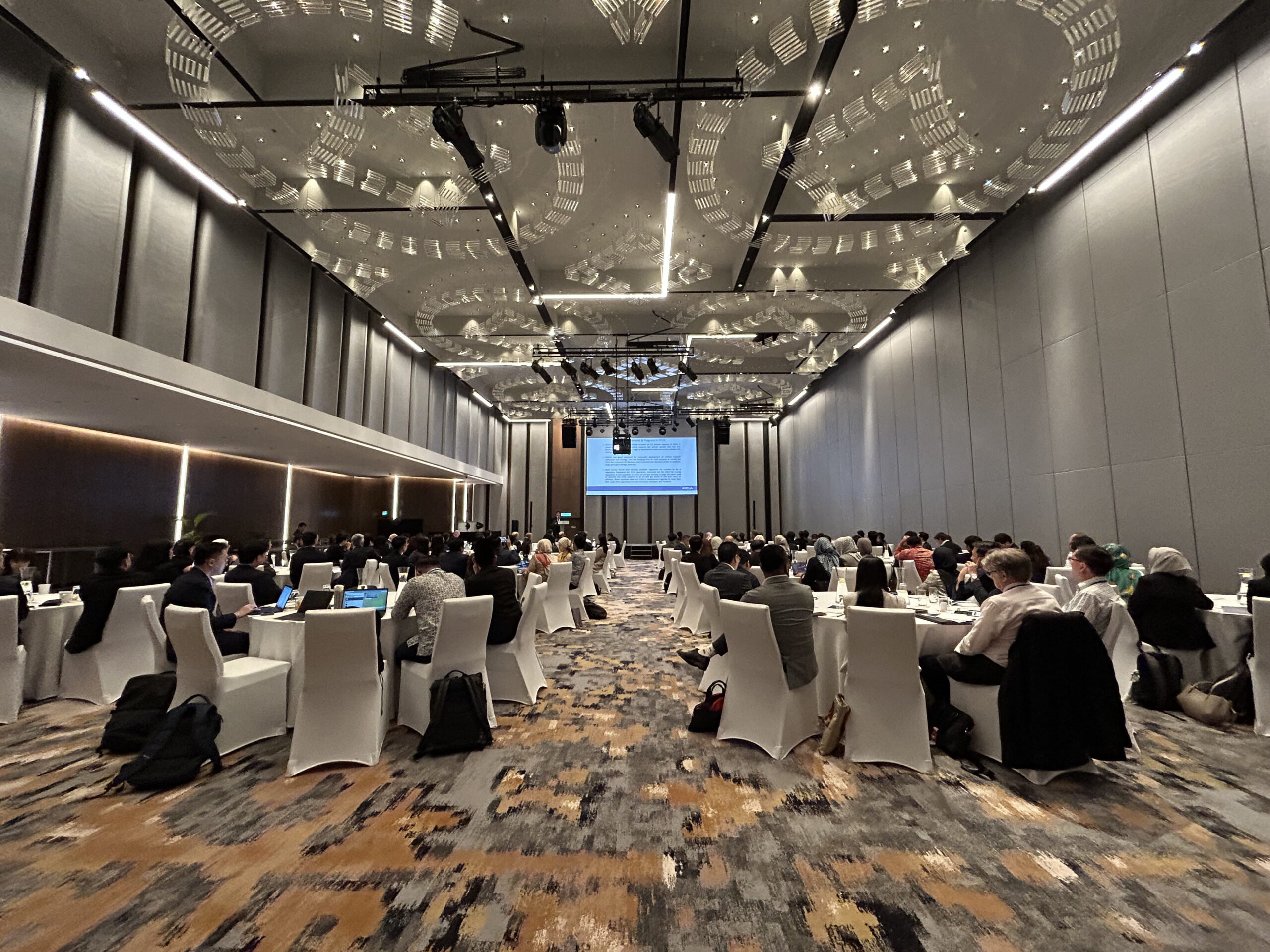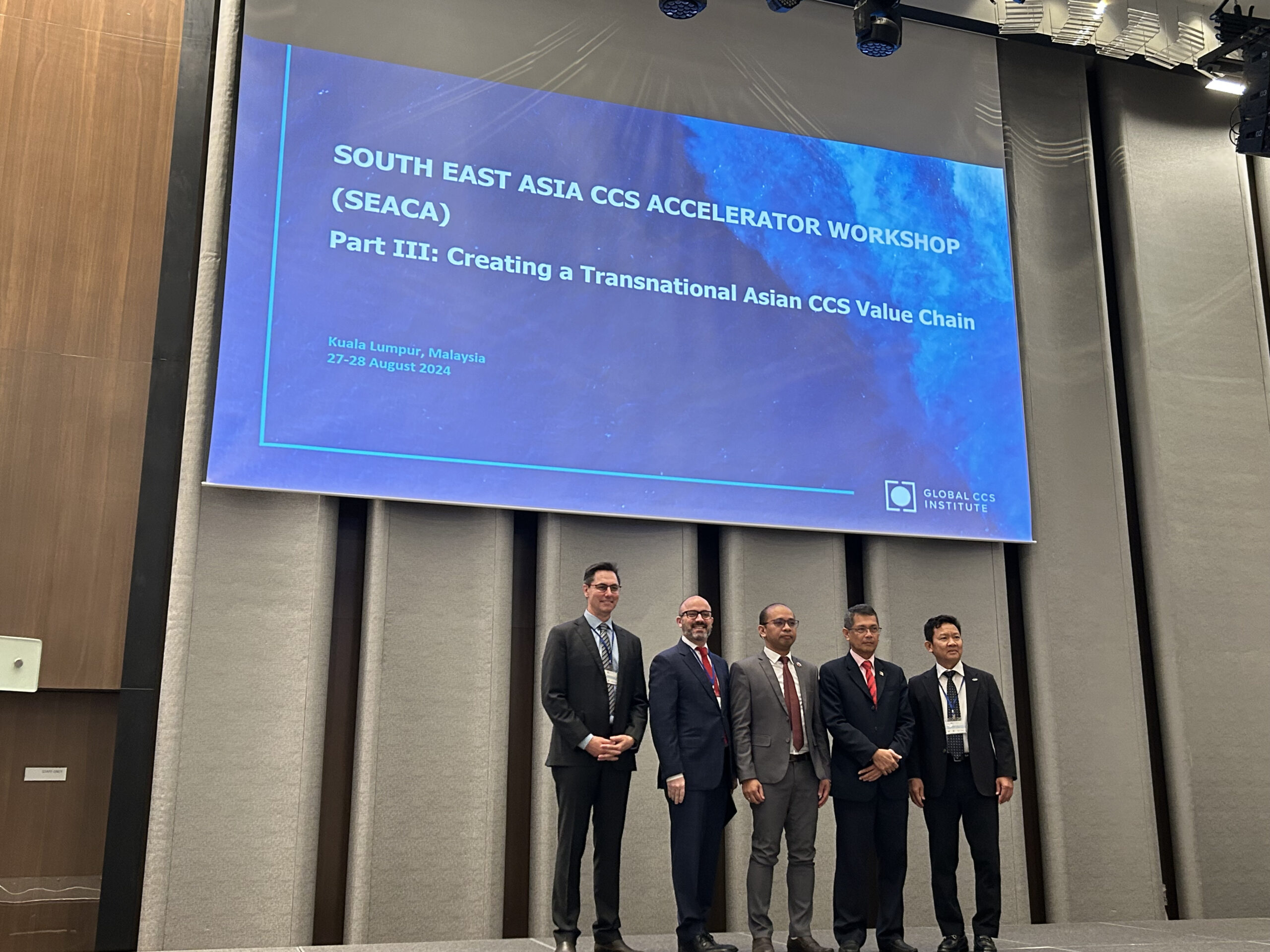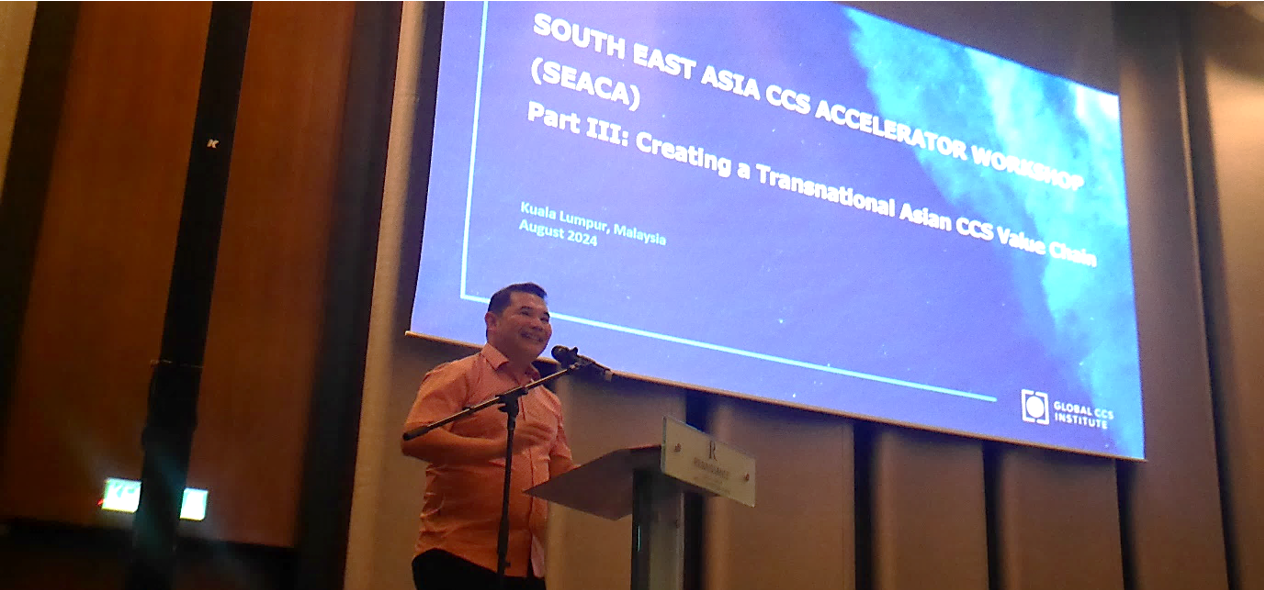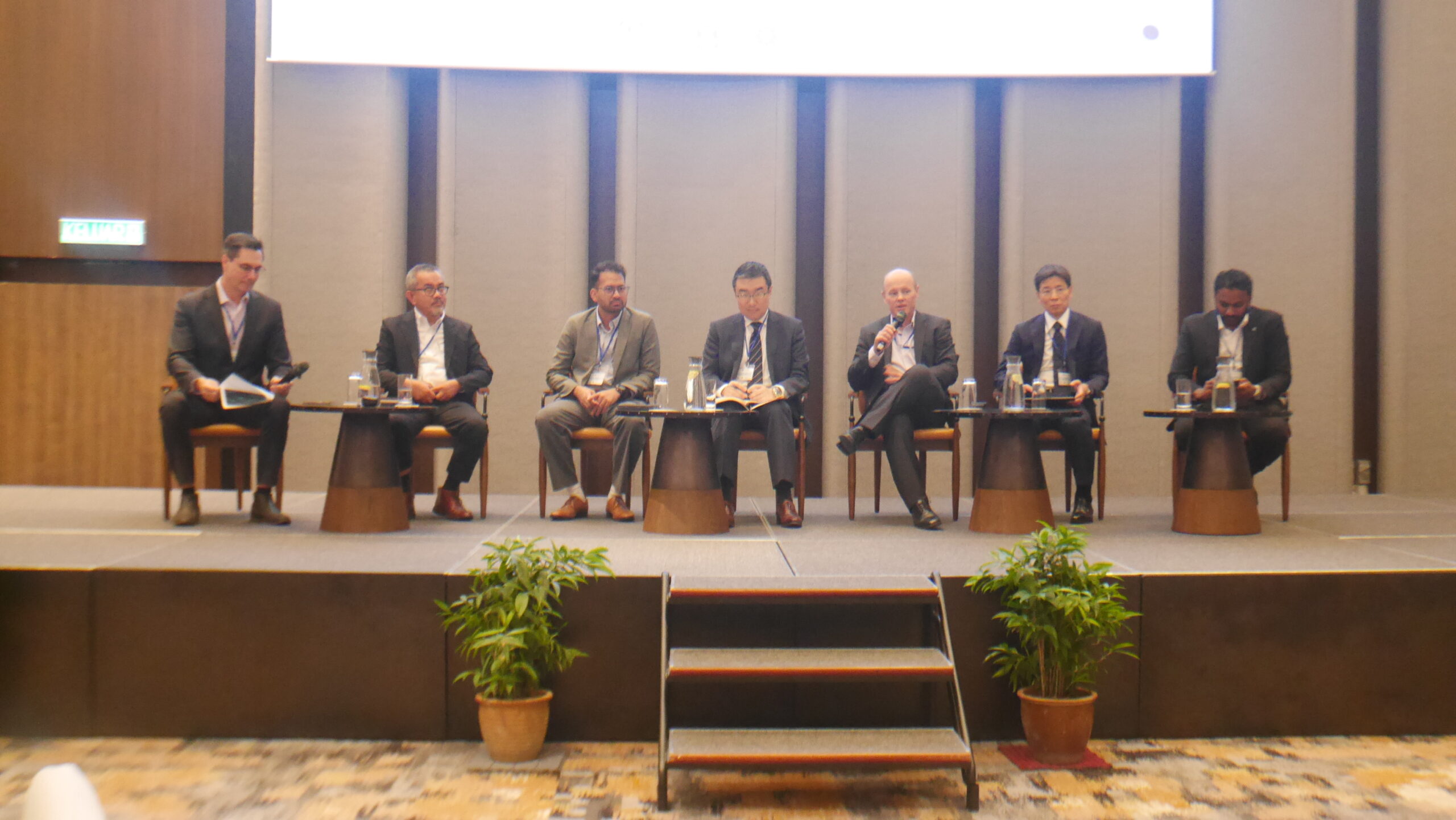Menu
The Association of Southeast Asian Nations (ASEAN) continues its commitment to accelerating the commercial deployment of Carbon Capture and Storage (CCS) technologies in the region, underscored by the 3rd SEACA Workshop held on 27–28 August 2024 in Kuala Lumpur, Malaysia. The event is hosted by the Ministry of Economy of Malaysia and co-organised by the Global CCS Institute (GCCSI) and the ASEAN Centre for Energy (ACE) in collaboration with Asia Natural Gas & Energy Association (ANGEA).
With the 7th ASEAN Energy Outlook projecting the region’s energy demand to triple by 2050—fueled primarily by fossil fuels, which are expected to constitute 88% of the energy mix—energy-related greenhouse gas (GHG) emissions could reach nearly 7,000 million CO2-equivalents by mid-century based on the baseline scenario. In 2023, the region launched the ASEAN Strategy for Carbon Neutrality document to accelerate the integration of green value chains, fostering cooperation and removing trade barriers among member states to expedite the market entry of green products. Further, this document pointed out several mitigation measures in reducing emissions, including the deployment of CCS/CCUS technologies by identifying potential CCS/CCUS hubs and providing policy supports to enable cross-border CO2 transportation.
The workshop brought together around 150 attendees from 17 countries to explore strategies for accelerating CCS deployment in Southeast Asia, in alignment with the ASEAN Plan of Action for Energy Cooperation (APAEC) and the goals of the Paris Agreement. This 3rd SEACA Workshop was the final event in the series, following the 1st Workshop in May 2023, which introduced participants to the potential of CCS in Southeast Asia, and the 2nd Workshop in November 2023 in Tangerang, Indonesia, which focused on ASEAN’s policies, regulatory frameworks, and storage resource development.


Photo 1. Participants Attending First Day of 3rd SEACA Workshop in Renaissance Kuala Lumpur Hotel, Malaysia
The workshop opened with welcoming remarks from Alex Zapantis, General Manager for External Affairs at GCCSI, who expressed appreciation for ACE’s collaboration in organising the SEACA events. YBhg. Dato’ Luqman bin Ahmad, Deputy Secretary General (Macro) of Malaysia’s Ministry of Economy, delivered the host country’s opening remarks, followed by speeches from Beni Suryadi, Deputy Executive Director of ACE; Dr Phoumin Han, Senior Energy Economist of ERIA; and Paul Everingham, CEO of ANGEA.

Photo 2. Group Photo After Opening Session (left-right), Alex Zapantis from GCCSI, Paul Everingham from ANGEA, Beni Suryadi from ACE, YBhg. Dato’ Luqman bin Ahmad from the Ministry of Economy of Malaysia, and Dr. Phoumin Han from ERIA.
Day 1 began with a panel discussion on establishing an Asian CCS Value Chain from a governmental perspective focused on cross-border challenges such as policy alignment, investment needs, and environmental and social considerations. Australia’s Department of Climate Change, Energy, Environment and Water (DCCEEW) emphasised its commitment to partnering with Asia-Pacific nations, particularly on offshore CCS development. Ministry of Energy and Mineral Resources (MEMR), Indonesia, called for collaborative efforts to establish a comprehensive CCS ecosystem. Ministry of Economy, Malaysia, stressed the importance of regional cooperation in integrating CCS into national strategies. The Korea CCUS Association emphasized international collaboration for regulatory development and technological innovation. Ministry of Energy, Thailand, and JOGMEC’s representatives also emphasised the need for global partnerships to advance regulatory and technological frameworks. Ministry of Petroleum and Mineral Resources, Timor Leste, also highlighted the critical role of international collaboration in overcoming regulatory and commercial challenges.
Following this, the focus shifted to the international legal framework governing transboundary CO₂ transport for geological storage. Experts from Allen & Overy Shearman, Ashurst, and the International Energy Agency Greenhouse Gas Programme (IEAGHG) provided insights into treaties like the London Protocol and addressed critical issues such as long-term liability for stored CO₂.
The final session of the first day addressed bilateral and multilateral agreements crucial for international CO₂ storage trade. Industry leaders from ExxonMobil, Santos Ltd, Shell, Air Liquide, Mitsui O.S.K. Lines, Ltd. (MOL), and PETRONAS discussed the importance of government-to-government agreements in regulating CO₂ storage, managing liability, and integrating these activities into national carbon accounting systems.
The day concluded with a Gala Dinner, where H.E. Mr. Rafizi Ramli, Minister of Economy of Malaysia, highlighted on the forthcoming Malaysia CCUS Bill. This standalone bill is expected to be tabled by end of 2024, which aims to enable the governance of all aspects along the CCUS value chain – a process that tends to take years is to be achieved in just months. This acceleration aims to support Malaysia’s net-zero aspiration, capture opportunities in the era of energy transition and attract CCUS investments into the country, positioning Malaysia to provide first of its kind integrated CCUS solution in the Asia Pacific region. Additionally, he also mentioned that Malaysia is ready for its upcoming ASEAN Chairmanship in 2025, signalling a commitment to greater cooperation in the CCS/CCUS area.

Photo 3. H.E. Mr. Rafizi Ramli, Minister of Economy of Malaysia, Delivering a Speech at the Gala Dinner
Day 2 began with a panel discussion on carbon accreditation for CCS projects, focusing on methods and carbon accounting requirements relevant to an international Asian CO₂ storage value chain, including the creation and ownership of carbon credits. This session was moderated by ANGEA with panellist from IETA, Mitsubishi Research Institute (MRI), and ExxonMobil.
The subsequent session addressed technical, operational, and infrastructure requirements for supporting an Asian CCS Value Chain, with discussions on how common standards could be applied. Panellists from BP Asia Pacific, Kawasaki Kisen Kaisha (K-LINE), Shell, Mitsubishi Heavy Industries (MHI), Chevron, and PETRONAS shared their perspectives on the infrastructure and safety standards necessary for effective CO₂ transport and storage.

Photo 4. Panel Discussion of the Technical, Operational, and Infrastructure Requirements Session (left-right), Alex Zapantis from GCCSI as moderator, Zulfikri Agus from BP Asia Pacific, Afiq Rahmat from Shell, Jun Sasaki from K-LINE, David Fallon from Chevron, Taichi Tanaka from Mitsubishi Heavy Industries, and Christopher K Singham from PETRONAS as panellists.
The final panel discussion explored the need for international collaboration and investment in CCS in Asia to support the development of a CCS Value Chain in the region. Speakers from The World Bank, Asian Development Bank, and JOGMEC described their organisations’ efforts in supporting, financing, and investing in CCS projects in Southeast Asia.
The workshop concluded with closing remarks from Alex Zapantis, officially bringing the SEACA Workshop series to a close. Alex highlighted the success of the workshop in uniting a diverse range of participants from both the private and public sectors. He emphasised the importance of discussions on serving the economic and climate ambitions of the ASEAN region through CCS. Additionally, he noted the significance and urgency of addressing the transnational value chain, a topic that was chosen for this workshop for its current popularity and the substantial ongoing developments in this area.
Materials from the 3rd SEACA Workshop can be downloaded [here] for Day 1 and [here] for Day 2.
